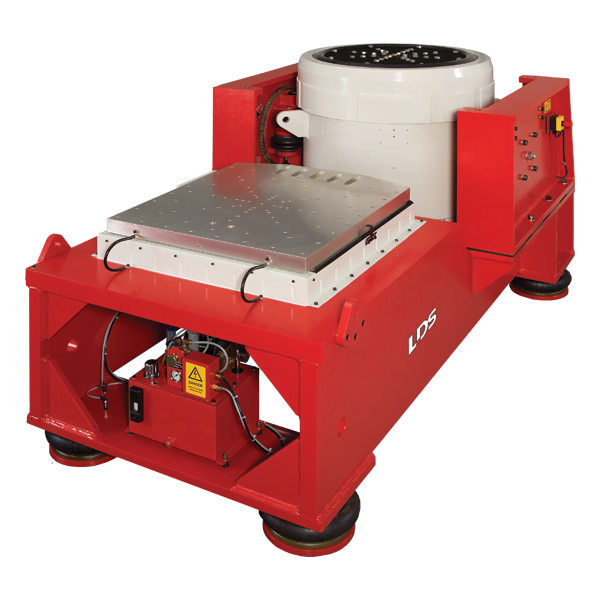LDS LPT Slip Tables
Low-Pressure Slip Tables
Low-pressure slip tables are designed for horizontal- and three-axis testing of payloads up to 1500 kg (3307 lb), such as automotive assemblies.
Solicitar ofertaFor testing applications requiring three individual axes, we recommend an LDS trunnion-mounted shaker and a slip table. A slip table typically consists of a magnesium plate sitting atop a smooth granite block, with a lubricating film in between. Both are housed in a frame that connects to the shaker’s armature, enabling it to excite payloads in the horizontal position.
Like the LDS® HBT series but with reduced stiffness and load-bearing capability, LPT slip tables are suitable for general-purpose vibration testing systems. They offer a cost-effective solution for most R&D and product verification applications, including testing of military equipment, electronic assemblies, and aircraft and automotive components.
USE SCENARIOS
- Three-axis testing
- Testing of avionics and defence hardware
- Testing of commercial and military aircraft assemblies
- Automotive component testing
- Testing of electronic assemblies
- Packaging and transport testing
STAND-ALONE SLIP TABLES OR COMBO SYSTEMS – WHAT TO CHOOSE?
- LDS® combo systems: For three-axis testing applications, we recommend the combo configuration, as it offers easy installation and accurate alignment between shaker and table, reducing test setup time when switching the position from vertical to horizontal.
- Stand-alone LPT slip tables: A trunnion-mounted shaker with a separate slip table on a seismic base is the favoured arrangement for testing large or dynamically complex payloads, as it delivers optimal pitch, roll and yaw restraints.
CHARACTERISTICS OF LOW-PRESSURE SLIP TABLES
These low-pressure tables feature high-stability granite bases and slip plates manufactured from tool-grade magnesium, chosen for its high strength and light weight. They incorporate guidance bearings to minimize axial distortion and are capable of displacement up to 63 mm (2.48 in). A film of pressurized oil between the base and the plate provides uniform support across the entire surface and enhances payload support by decreasing table rippling.
All LDS® combo systems with LPT slip tables are compatible with AGREE chambers and can be integrated with other equipment to perform environmental tests, including Combined Environmental Reliability Testing (CERT). Thermal barriers, to protect the shaker’s armature and the slip table when operating at high temperatures, are available as an option.

